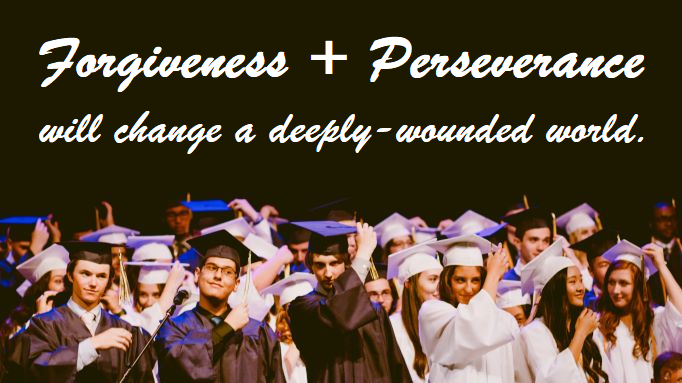Tagged: “Barriers to Forgiveness”
The person I am forgiving thinks that upon my forgiveness, our relationship can proceed as if the injustices never happened. How do I get him to realize this is not correct?
He has to see the difference between forgiving and reconciling. He might see your forgiving as giving in to his unacceptable behavior, which forgiving is not. This distinction between forgiving and reconciling may help him to see that he has work to do if the relationship will improve.
The other’s behavior repulses me. Does this mean I have not forgiven?
You can be repulsed by the other’s behavior when you forgive, but a central point of forgiving is to separate the person and the behavior. The challenge is to see the person as possessing inherent worth even if you are repulsed by the behavior.
Perseverance as the Missing Piece to Family, School, and Community Forgiveness
Having studied the psychology of forgiveness since 1985 and having helped plant forgiveness education in schools since 2002, I have come to realize that there is another moral virtue that needs to exist alongside forgiving if forgiveness is to mature in minds, hearts, and groups. That virtue is perseverance, or the willed decision and action to keep going despite challenges and to not get distracted by other issues. In the ethical treatise, Virtues and Vices (attributed to Aristotle, but possibly written by one of his followers), the virtue of perseverance or endurance is said to exist alongside the virtue of courage and daring. I would add that perseverance will be a moral virtue as long as it is connected to both wisdom and justice (as well as courage) because it is good only if the goal to which people are dedicating a good part of their lives is fair and reasonable. Persevering in bank robbery, for example, is vice not virtuous.
Perseverance is rarely discussed in modern society as we play with our gadgets and move from one forum to another. This kind of quick movement is part of what the 17th century French philosopher, Blaise Pascal, in his masterful work, Pensées, refers to as diversion. He challenged readers by saying that most people cannot endure even one hour alone in their own room without seeking new diversions. If this was the case over four centuries ago, how much more might diversion be weakening our ability to engage in the moral virtue of perseverance now?

In an earlier blog, I related an interaction with Mr. Brian McParland of St. Vincent de Paul Primary School in Belfast, Northern Ireland in the fall semester of 2002. Upon approving forgiveness education in his school, he told me that I would last only 3 years at this task because that is all the time anyone ever seems to give to new classroom initiatives. In other words, people do not persevere. I have seen the same in local groups that start forgiveness education programs with adults only to have them fade over time. Yet, as Aristotle reminds us, and challenges us, it takes time to grow deeply in the moral virtues. We do not become proficient in any moral virtue by giving it a try for a little while any more than we become physically fit by hitting the gym for a month and then going back to the couch and the potato chips. It takes time and effort to become forgivingly fit. It takes time to grow in the moral virtue of perseverance.
So, it seems to me that the first step in growing intra-personally in forgiveness, in aiding families and schools and local community organizations to grow in forgiveness is to openly and boldly and persistently discuss perseverance and the serious challenge all people face as they say, “Let’s hit the forgiveness gym!” Without perseverance, we lose our forgiving fitness very soon.
How much perseverance do we need to change the world? It seems to me that we need to introduce students to forgiveness, without forcing them to forgive, from age 4 to age 18. It seems to me that we need two generations, about 40 years, of forgiveness in communities to change those communities and to change community-to-community conflicts, even brutal conflicts that seem at present to have no end in sight. Forty years? Forty years when there will be new distractions, new shiny diversions? Yes, and it is the teamwork of forgiveness and perseverance, and leaders who will take over for other leaders, that will win in the peace movement. This combination of forgiveness and perseverance never has been tried anywhere in the world at any time in human history. It is time.
With perseverance, we might just be able to bring forgiveness for good to a deeply wounded world. Long live perseverance! Long live forgiveness!
![]()
I am ambivalent about “giving a gift” to the one who offended me. I do not think he will accept it. This likely will make me angry all over again. What do you suggest?
A complete sense of forgiving, or the essence of what forgiving is, includes this giving of a gift to the one who hurt you. Yet, you do not have to reach the deepest sense of forgiving to be practicing this moral virtue. If you are not ready to give a gift and if you have reduced your resentment and commit to do no harm to the one who hurt you, then you are forgiving at this point.
My friend thinks that by my forgiving her then all is supposedly well as if the injuries never even happened. How do I explain that my forgiving does not automatically alter the relationship to something great (when at this point, it is not)?
Your friend is confusing your forgiving with reconciliation. To reconcile means that both of you come together again in mutual trust. It seems that you are not quite ready to fully trust her at this point. Yes, forgiving is an important step toward reconciliation, but she now will have to do her part to avoid injuring you as she has done in the past.




